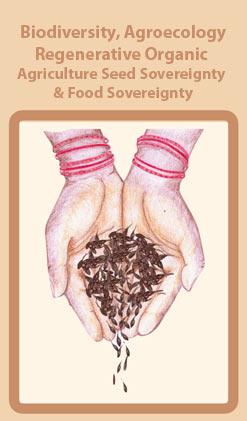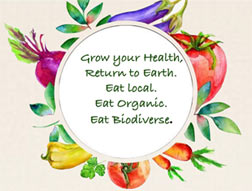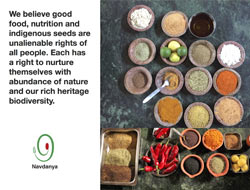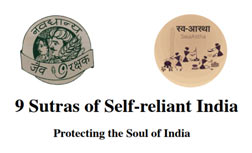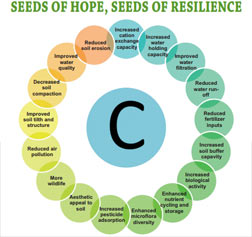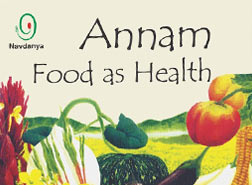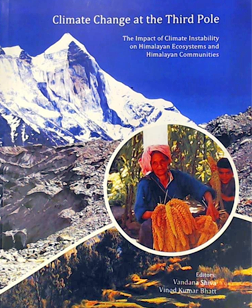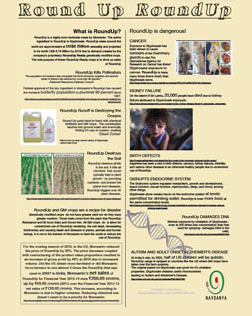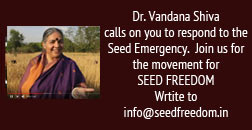A Southern initiative to build an international coalition of women to respond to globalisation and its impacts by creating diverse solutions at the local level and a common defence at the global level.
The need for a global coalition to respond to globalisation

Economic globalisation is sweeping across the world, making the gap between the rich and the poor wider and deeper, increasing the spread of cultural and biological monocultures, and increasing the vulnerability of both ecosystems and social systems to break-down and disintegration. New epidemics are emerging, old ones are resurging creating a major crisis in public health. Economic crises have caught entire economies by storm, leading to massive unemployment. More and more societies are trapped in religious, ethnic and cultural warfare. The end of this century is clearly a period of severe violence and dislocation.
As the 2nd millennium draws to a close, women's energies are needed to shape the next millennium on the basis of peace in place of violence, justice in place of deepening inequality, sustainability in place of non-sustainable exploitation of the earth's resources and a cultural and biological diversity in place of monocultures and homogenisation.
Third World women have a special role to play at this historical moment, since they pay the highest price and are the worst victims. Women of the South pay the highest price for economic globalisation in terms of food insecurity and health insecurity. They loose the most knowledge, skills and livelihoods when new technologies are introduced, or when their knowledge is appropriated through `biopiracy' and intellectual property rights. They are the worst victims of civil wars, ethnic and religious violence. And they pay the biggest price through increasing poverty under globalisation and structural adjustment programmes.
While the women of the South bear the worst burden in terms of the costs of globalisation, they also have the experience to build alternatives. Since globalisation is also the globalisation of poverty, food insecurity and social disintegration, women's experiences from the South can help build a global response to economic globalisation in all its dimensions.
In recent years the global expression of women's concerns has had a Northern bias. In Cairo and in Beijing the differences between the North and the South were apparent. Instead of letting our concerns be marginalised, we would like to build an international coalition of women acting in coherence on issues that concern the women of the South most - food security, health security, economic security, environmental security and peace. These are also the issues that most affect the future of people and the planet, and the issues from which women have been excluded in global decision making.
We would like to:
-
Articulate our concerns on our terms, from our realities
-
Intervene in the most urgent economic, political and environmental issues at the international level with collective strength
-
Find our partners in the North on the basis of our priorities and processes initiated by us
Third World women hold the highest potential for creating alternatives for peace, justice and sustainability. While being South centred, the women centred plurality of alternatives will also be based on South - North solidarity and gender solidarity. Diverse Women for Diversity thus begins in the South, but is based on an inclusive philosophy of ever-widening circles of transformation and change.
The Value of Diversity
Violent technologies and a violent economic system are creating violent societies - with country after country sinking into a vicious cycle of economic insecurity and social decay and disintegration.
As ordinary women from across the world, we want this insanity and violence to end.
Making peace with diversity is fast becoming a survival imperative in our times of "ethnic cleansing" and the spread of monocultures, in society and in nature.
Monocultures are an essential component of globalisation. Globalisation is premised on homogenisation and the destruction of diversity.
Globalisation is a recolonisation of life in all its diversity -- cultural and biological.
This war against diversity is not entirely new. Diversity has been threatened whenever it has been seen as a threat and an obstacle. Violence and war are rooted in treating diversity as a threat, a disease, a perversion, a source of disorder. Globalisation transforms diversity into a disease and deficiency because diverse systems cannot be brought under centralised control. Global control of raw materials and markets makes monocultures necessary.
Homogenisation and monocultures introduce violence at many levels. Monocultures are always associated with political violence, the use of coercion, control and centralisation. Without centralised control and coercive force, this world filled with the richness of diversity cannot be transformed into uniformity and homogenous structures, and without coercion and centralised control, these monocultures cannot be maintained. Self-organised and decentralised communities and ecosystems give rise to diversity. Globalisation gives rise to coercively maintained monocultures.
Monocultures are also associated with ecological violence towards nature's diverse species. They are in fact a declaration of war against species. The violence does not cease with pushing species to extinction. It continues to be the mode of controlling and maintaining monocultures. Monocultures are vulnerable to ecological breakdown and are non-sustainable. Uniformity implies that a disturbance to one part of a system is translated into a disturbance to other parts. Instead of being contained, ecological destabilisation tends to be amplified. Sustainability and diversity are ecologically linked because diversity offers the self-regulation and multiplicity of interactions, which can heal ecological disturbance to any part of a system.
Women everywhere are active at the grassroots, creating and leading peace movements, ecology movements, and movements for socio-economic justice. Even while women and children are the worst victims of violence, inequality and environmental degradation, it is women who are taking the lead to provide alternatives based on peace, sustainability and justice. Inspite of each of these movements having emerged separately, they are all connected to the possibility of diversity.
While reproductive rights have held attention since Cairo and Beijing, the economic and environmental rights for which women struggle in their everyday lives have been neglected both by international agencies and by the academy. There is urgent need to fill this vacuum at the international level. Women's thinking is providing alternative paradigms which are essential for providing alternatives in this period dominated either by the "TINA Syndrome" (there is no alternative) or by the approach that difference undermines any ground for solidarity and integration among people.
The movement of Diverse Women for Diversity is aimed at bringing the voices of women at the grassroots in diverse settings - to shape the millennium on the basis of the alternatives they have articulated and envisioned for peace and for environmental and economic rights. It is aimed at overcoming people's incapacity and hopelessness in the face of severe ecological, economic and political breakdown.
A global women's movement - which is a movement of movements, forming a coalition of grassroots responses on the most urgent issues of our time, needs to be strategically built on the basis of struggles and initiatives at the grassroots because the dominant paradigm of globalisation leaves purely local initiatives inadequate both in terms of providing alternative paradigms and alternative ways to act. The movement will build over two years to make the alternatives that women are creating and shaping as the foundation of human evolution in the next millennium based on peace, sustainability and justice. Thus, it will evolve in a participatory mode, building from the grassroots to the global, from the micro to the macro, and feeding back to the grassroots with new strength initiatives and information.
Linking the grassroots with the global
The present project has the objective of bringing together women from diverse regions and from different movements who are working on food security and health security, and conservation of biological and cultural diversity in the context of globalisation in a global coalition. We want to intervene collectively as women in some of the most significant issues of our time, with the women of the South and the women at the grassroots playing a leading role in agenda setting, prioritisation, actions and programmes. We want to continue our search for diverse solutions at the local level and a common defence at the global level. Some of us have been present on international negotiations while also being active in our local and national contexts. However, women as a collective force have been missing in the global processes related to peace making and peace keeping, economic globalisation and trade, biodiversity, biotechnology and intellectual property rights.
While women of the South are the primary custodians of biodiversity and the main actors related to Biodiversity Conservation, the women's organised collective voice has not been present in the processes related to the Convention on Biological Diversity (CBD), which was the treaty signed at Rio to protect biodiversity. We did, through the Women's Agenda 21, make a major difference to the Rio process, and would like to ensure that women's perspectives stay integral to the implementation of CBD.
Similarly, while most mobilisation on the impact of globalisation at the grassroots is led by women, women have not been a big presence at the World Trade Organisation (WTO), which is the trade body that was formed at the end of the Uruguay Round of GATT in 1995, where globalisation processes are decided and controlled.
1998 will be a significant year with the Fourth Conference of the Parties of the Convention on Biological Diversity taking place in Bratislava in May 1998 and the Second Ministerial Conference of WTO taking place immediately afterwards in Geneva. In 1999, the TRIPs Agreement (Trade Related Intellectual Property Rights Agreement) will come up for review. In 2000, the Agreement on Agriculture will come up for review.
We as women, have been active in evolving a South - centred women - centred agenda for food security. Dr. Vandana Shiva with Prof. Maria Mies initiated the Leipzig Appeal on Food Security which became the basis of the Women's Day on Food at the NGO event at the World Food Summit. In 1991, as co-chair of the Women and Environment and Development Network, Dr.Vandana Shiva helped organise the Miami Congress on Women and Environment which led to the Women's Agenda 21, the major women's input in Agenda 21.
As a response to the threat to cultural and biological diversity posed by globalisation and as a process for building and concentrating women's energies to articulate and provide alternatives based on equality, justice, sustainability and peace, the Diverse Women for Diversity (DWD) project has evolved as a collective project originated in October 1996 by the following women;
-
Dr.Vandana Shiva of The Research Foundation for Science Technology and Ecology
-
Ms.Beth Burrows of The Edmonds Institute
-
Ms.Christine von Weizsaecker of Ecoropa
-
Prof. Jean Grossholtz of Mt. Holyoke College
Dr.Vandana Shiva, Ms. Beth Burrows and Ms. Christine von Weizsaecker have been participating in the meetings of the Convention on Biological Diversity (CBD) process since 1992, and have played a key role in negotiations for a Biosafety Protocol.
We now feel the need to build a global coalition of women who are engaged in grassroots networks but who are also influencing national and international policy in their respective fields. Besides linking the grassroots with the global, we also want to establish links between different networks which are more issue based, so that a coherent philosophy and strategy for change can evolve. It is this coherence in action and thought that will grow in a participatory process to shape a women's agenda for peace, justice and sustainability in the next millennium.
The Movement Programme
This proposal is aimed at building a global coalition of women as a collective process with particular focus on six areas which most concern women in their everyday lives and in which networks already exist at the grassroots. DWD will connect the diversity networks across regions and across issues and sectors. DWD as a network of networks and a movement of movements will build, strengthen and integrate the networks in the following areas:
-
Women's Food Security Networks
-
Women's Health Networks
-
Women's Biodiversity and Biotechnology Networks
-
Women's Knowledge and Intellectual Property Rights Networks
-
Women's Globalisation and Economic Diversity Networks
-
Women's Peace and Cultural Diversity Networks
In each of these areas, women are primary actors at the grassroots but are missing as a force when it comes to global decision making processes. In addition, women in different regions and different issues are not able to come together as a collective force in global change. The project will contribute to this much needed coalition building.
The project is aimed at closing this gap between the local and the global and to build links between women's health movements, women's ecology movements, women's science movements and women's movements for food security, including farmers and consumers, women's movements for economic justice and economic security and peace.
The Diverse Women for Diversity (DWD) movement has so far been built on locally available resources. However, organising women's energies and amplifying women's voices and visions to reach global decision making during this critical point of transition to a new millennium during a period of rapid transformation requires an organised response.
Diverse Women will build global coalitions of locally embedded networks by facilitating the integration and coming together with ideas and actions that women are in any case generating at the grassroots. The Diverse Women movement will catalyse the global response by bringing together existing movements and networks active in the areas of food security, health, biodiversity, biotechnology, intellectual property rights, peace and alternative economic arrangements. The global coalition and collective articulation will then provide new strength and vigour to the movements at the grassroots. These leading network representatives will facilitate the work in each programme area and act as convenors for all activities and meetings.
Women's Food Security Networks
This work programme will build in the work on food security started at the Leipzig Conference and the World Food Summit and local initiatives to strengthen household, local and national food security. The ruling patriarchal paradigm states that free trade will generate food security. But women's experience shows that the market leaves out those who need food the most – children, women and the poor. The work programme on food security will on the one hand strengthen existing movements of women in the area of food security, and on the other hand, it will lead to an alternative to the free trade agenda of the WTO. The Agreement on Agriculture will be up for review in 2000. Women's organised input at the global level is necessary as an input in the review process.
Further, women's responses at the grassroots are also necessary to ensure household and community food security. The issue of food safety as an essential element of food security will connect the women's actions in the North and South, since food safety is becoming a major issue with Mad Cow Disease and the commercialisation of genetically engineered foods.
Outputs expected:
-
Participatory Documentation of Women's Food Security Alternatives
-
Monitoring of the Impact of Globalisation and Agriculture and its Impact on Women and Children
-
Review of the Agriculture Agreement of WTO from the perspective of Third World Women
Women's Biodiversity and Biotechnology Networks
On issues related to biodiversity and biotechnology, women have been the most influential in shaping alternatives to the global patriarchal paradigm based on irresponsible introduction of genetic engineering into the global food system and the appropriation of the world's biodiversity as the raw material for a handful of corporations.
An international legally binding protocol setting standards for the trade in genetically engineered organisms would be a crucial signal against deregulation of environmental and health security. There is an emerging conflict between CBD and GATT/WTO. An international legal framework on biosafety can stop the rat race towards deregulation serving comparative advantage at the detriment of the environment and human health. We as women want to engage in a conflict resolution between the Rio agendas for sustainability and equity and the WTO agenda for free trade and globalisation.
Outputs expected:
-
Participatory Documentation of Women's Resistance to Genetic Engineering
-
Women's Interventions in the Biosafety Negotiations and Meetings of WTO and Codex Alimentation
-
A Network of Women Scientists to Monitor and Analyse the Impacts of Biotechnology on Health and the Environment
Women's Knowledge, Community Rights and IPRs Networks
500 years ago, women's knowledge was appropriated and women as knowers were threatened through witch-hunts. Today, women's knowledge is once again being appropriated through "biopiracy" - and women are being denied their status as knowers and experts in knowledge related to biodiversity.
Today it is women leading the movement against the new inquisition embodied in "Patents On Life". Women have led the referenda on ‘Patents On life' in Switzerland and Austria. All women MEPs - irrespective of parties, voted against the European Patent Directive.
The programme will be on women's knowledge built on women's perspectives on the sharing and monopolisation of knowledge and on patents on life and will create alternatives to the IPR system.
The programme will also provide a women's input for the Review of TRIPs in 1999.
Outputs expected:
-
Women's Biopiracy Watch Network
-
Women's Perspectives on Knowledge, Community Rights and IPRs
-
A Review of TRIPs from the perspective of women, especially Thrid World Women
Women's Health Networks
The focus of the coalition building of Women's Health Networks will be
-
Strengthening women's health traditions, especially their expertise in the knowledge and use of medicinal plant diversity
-
Monitoring the impact of economic globalisation and structural adjustment on women's health
-
Monitoring the "biopiracy" of women's health knowledge
-
Assessing the impact of IPRs on women's access to health care
- Discussion of the issue of cloning and reproductive rights
Outputs expected:
-
Participatory Documentaion of Women's Indigenous Health Traditions
-
Study of the Impact of Economic Globalisation and Structural Adjustment on Women's Health
-
Analysis of the Impact of IPRs and Rights to Health as input to Review of TRIPs in 1999
Women's Globalisation and Economic Diversity Networks
Globalisation, free trade, the liberalisation of imports and exports, are creating an economic monoculture. As the crisis of the South East Asian tigers shows, economic monocultures are also vulnerable to major breakdowns triggered by small disturbances. Globalisation is also creating a ficitious growth, with the virtual economy of US $3 trillion per day which is at least sixty times greater than the real economy of goods and services. The programme on globalisation and economic diversity will look at the impact of globalisation on women as well as the diverse economic options available through which women generate survival even while being excluded from the global market economy.
Outputs expected:
-
Reports on the Economic Impact of Globalisation from the Grassroots
-
Women's Perspective on the Global Economy and on Economic Diversity and Economic Alternatives
Women's Peace and Cultural Diversity Networks
The programme on Peace and Cultural Diversity will focus on firstly, societies and contexts where the break down of peace is taking place under fundamentalism or terrorism, and secondly, on making women's interventions for peace stronger and more visible. The programme will also study the connections between economic globalisation, structural adjustment and violence in society.
Outputs Expected:
-
Study of the Linkages between Economic Globalisation and the Increase of Societal Violence
-
Women's Perspective on the Impact of Globalisation on Ethnic Conflict
-
Establishing Women's Peace Initiatives and Interventions in Regions of Conflict
Diverse Women for Diversity Milestones
Biosafety Protocol
-
When?
-
Where?
-
What?
|
June 1996 |
Leipzig, Germany |
'Women's Leipzig Appeal' launched at the Technical Conference on Plant Genetic Resources. |
|
September -October 1996 |
San Francisco, U.S.A. |
Diverse Women for Diversity' conceived by Beth Burrows, Christine von Weizsaecker, Jean Grossholtz and Vandana Shiva during the State of the World Forum in San Francisco and on follow-up dialogues in U.S. |
|
November 1996 |
Buenos Aires, Argentina |
'Diverse Women for Diversity' further developed by Beth Burrows, Christine von Weizsaecker, Jean Grossholtz and Vandana Shiva during the CBD negotiations. |
|
November 1996 |
Rome, Italy |
'Women's Day on Food' at the Food Summit based on the Leipzig Appeal organised by Maria Mies and Farida Akhter. |
|
March 1997 |
Austria |
Referendum on Genetic Engineering. |
|
May 1997 |
Montreal, Canada |
Biosafety Protocol |
|
October 1997 |
Montreal, Canada |
Biosafety Protocol. |
|
November 1997 |
Zurich, Switzerland |
International support launched for the Swiss referendum. |
|
May 1998 |
Bratislava, Slovakia |
Diverse Women for Diversity' events at COP IV of CBD. |
|
Year 1999 |
Geneva, Switzerland |
TRIPs Review |
|
Year 2000 |
Geneva, Switzerland |
Agreement on Agriculture |
|
Year 2000 to be decided The Millenium Agenda for Peace, Sustainability and Justice |
||
ACTIVITIES AGENDA
Activities Planned Till 2000
The Diverse Women for Diversity (DWD) movement has so far been built on locally available resources. However, organising women's energies and amplifying women's voices and visions to reach global decision making during this critical point of transition to a new millennium during a period of rapid transformation requires an organised response.
DWD will not organise local movements -- it will merely facilitate the integration and coming together with ideas and actions that women are in any case generating at the grassroots. The DWD movement will catalyse the global response by bringing together existing movements and networks active in the areas of food security, health, biodiversity, biotechnology, intellectual property rights, peace and alternative economic arrangements. The collective articulation will then provide new strength and vigour to the movements at the grassroots.
These leading network representatives will facilitate the work in each programme area and act as convenors for all activities and meetings as discussed earlier. Each sub-programme will have its independent plans of activities. However, to give coherence, to the movement, the sub-programme facilitators will meet as an international steering group in 1998 to evolve the plan of action for the millennium agenda.
DWD will also organise women's inputs during international meetings where discussions occur which have a direct impact on women's everyday lives. DWD plans to organise events around the following;
May 1998
1. The IVth Conference of Parties of the CBD (May 4th -15th, 1998) in Bratislava
2. The Second Ministerial Meeting of the W.T.O. (May 15th-18th,1998) in Geneva
December 1998
3. The Special Conference of the Parties of the CBD (December 1998) in Montreal which will decide on the Biosafety Protocol. As a follow up to these events, a women's collective input will be made for two major W.T.O. agreements that will be up for review.
1999
4. The Review of the TRIPs Agreement.
2000
5. The Review of the Agriculture Agreement.
In addition, meetings will be organised on key themes to bring women's voices from the grassroots to the global by bringing together key networks.

